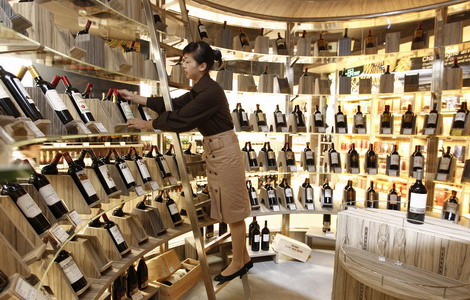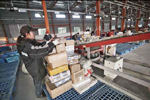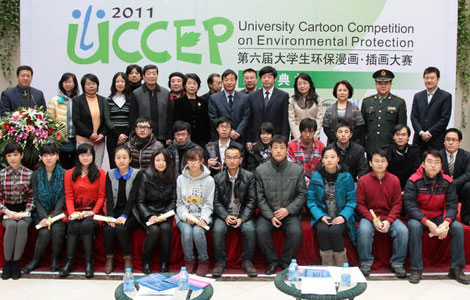Investors with extremely good taste
Updated: 2012-01-02 09:57
By Xu Junqian (China Daily)
|
|||||||||||
|
 |
|
An assistant ensures that wine is stored at the correct temperature at China Resouce Vanguard supermarket in Shanghai on July 29, 2010. [Photo / China Daily] |
BEIJING - When Wang Hai decided to turn his garage, where he parked his BMW and Mercedes Benz, into a wine cellar a few months ago, the trader expected his "new investment and hobby" would be a topic of conversation among his friends, many of them executives with small export firms.
It was only afterwards that the 46-year-old businessman discovered that his million-yuan investment was actually nothing new in Yiwu, a small town in Zhejiang province.
"Comparing collections of fancy cars and big houses is no longer in vogue here. The new trend is wine," said Wang, whose prize possession, among hundreds of bottles, is a Chateau Lafite Rothschild 1965, typically 40,000 yuan ($6,320) to 50,000 yuan a bottle.
As the stock market is fluctuating and real estate policy tightening, the wine market has become the new playground either as investment, hobby, or both for business people from the opulent Yangtze River Delta and possibly nationally.
Wang recalled that there are approximately 50 people in their "wine buddy circle" in Yiwu. They discuss different types of wine, information about where to buy a certain wine, and meanwhile, sip their collection.
"We spend, on average, 100,000 yuan annually on wine but some collectors spend that in a month. Like last year, a friend of mine booked 61 bottles of red wine in three months, each of them priced over 10,000 yuan and produced by 61 different French vineyards," Wang told China Daily.
Although there are no statistics showing how many people actually have a wine cellar, Li Peixu, who helps people like Wang at a wine counseling company based in Hangzhou, capital of Zhejiang province, sees wine collection growing in popularity.
"Cellars, or more generally, a private wine collection, will be an increasing trend among wealthy Chinese people," Li said.
Li's company provides services such as wine selection, tasting, cellar design and decorating. Every month Li receives dozens of people like Wang from all over Zhejiang, and from neighboring provinces, who want to collect.
"We have helped one of our clients in Yiwu turn a 90-square-meter underground car park into a fully-equipped cellar with temperature and humidity controls. It cost more than a million yuan just for decoration," Li said.
Li added that most of his clients are very "rational" and "sophisticated".
"They are usually widely traveled and care about the taste and history of the wine," he said.
To meet surging demand from the domestic market, many foreign wine dealers have shifted their focus to China, widely tipped to be the next world number one market.
Research published by International Wine and Spirits Report forecast that by the end of 2011 overall Chinese wine consumption will exceed that of Britain to be the world's fifth-largest.
And by 2016 it is estimated that the consumption market will grow to 250 million cases annually, twice that of 2010.
Christopher Cordier, a wine seller from France, has just been to Shanghai and was "surprised" by the "exciting" industry.
"Basically, the wine market is thriving in all aspects, for pleasure and for investment," said Cordier, whose products range from 60 yuan to 60,000 yuan.
Daily turnover on the Shanghai Wine Exchange, an online platform focusing on red wine in operation since July, has been about 10 million yuan, with Chateau Lafite purchases accounting for 20 to 30 percent.
Wang Jiaqi, business development director at the exchange, believed that there is still ample space for wine investment in the high-end market.
By the end of 2011, there will be more than 590,000 people in China with disposable assets of at least 10 million yuan and total assets of 18 trillion yuan, according to a recent study.
If only 0.5 percent of the wealth goes to wine investment, the market will reach 90 billion yuan, far exceeding the annual sales of French Bordeaux wine, which is estimated to be around 30 to 40 billion yuan, Wang said.
And the interest is unlikely to fade, despite a dip in the price growth of Chateau Lafite from 30 to 10 percent in the past ten months.
Some analysts believe that this is just the market adapting to a new taste.
Related Stories
China to be sixth largest wine market by 2014 2011-03-02 15:16
Newly rich thirsty for top vino 2011-01-04 08:03
Parker smells potential in China's wines 2011-11-28 16:15
Focus on quality in Chinese wine industry 2011-06-14 13:45
- China to support SMEs via govt purchasing
- SAIC Motor sees 12% vehicle sales growth
- China to scrap 253 types of administrative fees
- Restaurant serves dish of controversy
- PBOC stresses prudent monetary policy
- Luxury hotels target Chinese
- Safety risks of Subaru vehicles warned
- Aflatoxin level in milk products normal: AQSIQ









